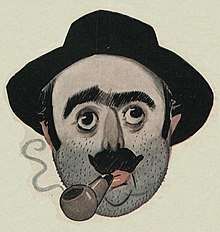Emilio Carrere
Emilio Carrere (Madrid, 18 December 1881 - Madrid, 30 April 1947) was a Spanish writer. He is best known for his 1920 gothic historical novel La torre de los siete jorobados (Eng: The Tower of the Seven Hunchbacks). In 1944, this was the basis for the film, La torre de los siete jorobados, directed by Edgar Neville.[1]
Emilio Carrere | |
|---|---|
 | |
| Born | 18 December 1881 |
| Died | 30 April 1947 Madrid, Spain |
| Occupation | Writer |
Works
Poetry
- Románticas (1902)
- El caballero de la muerte (1909)
- Del amor, del dolor y del misterio (1915)
- Dietario sentimental (1916)
- Nocturnos de otoño (1920)
- Los ojos de los fantasmas (1920, second edition, Buenos Aires, 1924)
- Ruta emocional de Madrid (1935)
Prose
- La cofradía de la pirueta (1912)
- Rosas de meretricio (1917)
- La copa de Verlaine (1918)
- Aventuras extraordinarias de Garcín de Tudela (1919)
- La torre de los siete jorobados (Eng: The Tower of the Seven Hunchbacks) (1920)
- El sacrificio (1922)
- La Amazona (1923)
- La cortesana de las cruces (1925)
- La calavera de Atahualpa (1934)
gollark: Because of exam regulations and whatnot, the existing companies probably have a bit of a monopoly (oligopoly?).
gollark: Probably counts for part of it, at least.
gollark: That's probably the excuse calculator manufacturers have for their higher-end stuff costing as much or more as an infinitely more capable RPi.
gollark: Given the current state of software security I want computers far from my brain.
gollark: I would hope so. Powering on a watch to check the time would be annoying.
References
- Hardy & Mile p.86
Bibliography
- Hardy, Phil & Milne, Tom. Horror. Aurum Press, 1996.
External links
This article is issued from Wikipedia. The text is licensed under Creative Commons - Attribution - Sharealike. Additional terms may apply for the media files.